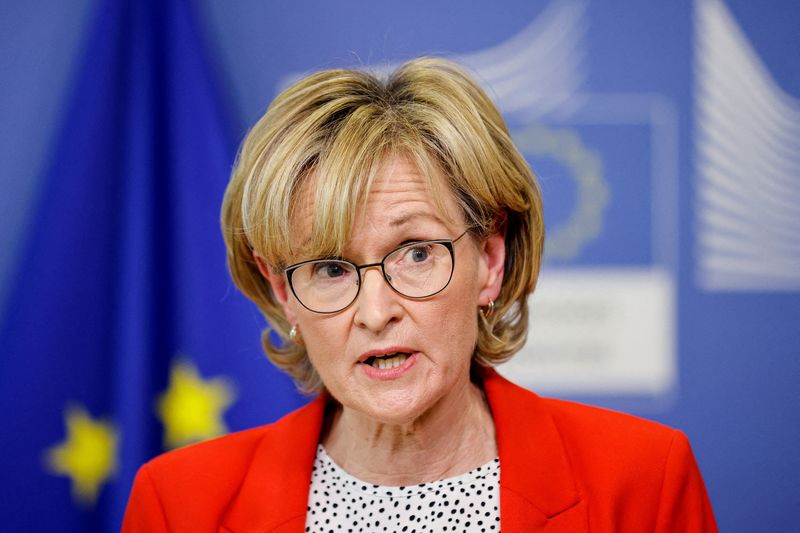By Huw Jones
LONDON (Reuters) - European Union plans to shift derivatives clearing worth trillions of euros from London to the bloc have ditched hardline rhetoric in favour of pragmatism that should limit the risk of EU banks losing out to foreign rivals.
Clearing, which ensures a stock or bond trade is completed even if one side of the deal goes bust, creates the vast pools of liquidity needed to anchor a major trading hub.
It has long been a flashpoint between London and Brussels, particularly after Brexit pitted Britain in direct competition with financial centres like Frankfurt and Paris in the bloc.
EU financial services chief Mairead McGuinness has likened ending the bloc's heavy reliance on London for clearing euro contracts to weaning the EU off Russian gas so that Brussels builds "open strategic autonomy" in capital markets to safeguard financial stability.
While much of UK financial services have been cut off from the EU by Brexit, Brussels has given UK clearers temporary access until June 30, 2025, with McGuinness insisting in the past there would be no extension.
Efforts by Brussels to encourage a voluntary shift in clearing were opposed by banks, and the draft law requires EU market participants to have an account with an EU clearer, which most already have, for a minimum level of business in any of three specified contracts.
"I think there is less resistance that there was in the early stages. There is an understanding that this is going to happen," McGuinness said.
Banks which overly rely on foreign clearing houses face capital charges on their exposures.
Relocating clearing involves closing contracts in London and opening new ones in the EU, a costly exercise which exposes banks to risks from changes in markets.
Other parts of the draft law help EU clearers compete better with U.S. peers, who benefit from faster regulatory approvals for new products or changes in risk models. This will help build a more efficient market that makes relocation of clearing from London attractive, McGuinness said.
"We think that overall it looks quite positive and quite balanced, and helps competitiveness and robustness of the market," said Rafael Plata, secretary general of EACH, which represents clearers in Europe.
'COMPETITIVE DISADVANTAGE'
The EU is targeting three contracts widely used by companies to insure themselves against adverse moves in borrowing costs - and not all clearing activity, as some had feared.
The London Stock Exchange Group (LON:LSEG)'s LCH clearing arm in London said its notional registered euro interest rate swaps totalled 191.3 trillion in the first half of 2022. EU domiciled firms - over which the bloc's rules would apply - accounted for only 29% or 56.3 trillion euros of the total, it said.
Business would relocate to Deutsche Boerse (ETR:DB1Gn)'s Eurex clearing arm in Frankfurt, whose notional outstanding in interest rate derivatives totalled 28 trillion euros in October, a market share of roughly 20%, Eurex said.
The second contract - euro credit default swaps - are cleared by ICE (NYSE:ICE) in London, though the company intends to move the business to Chicago next year, with EU banks already allowed to clear there. LCH's Paris unit could also clear the CDS contracts.
The third contract - euro short-term interest rate futures or STIRs - are also cleared by ICE. Industry officials note EU based clearing liquidity in this contract would effectively need to be built up from scratch, which could take time.
ICE declined to comment.
Brussels wants to "gradually" reduce clearing outside the EU in these three contracts from "substantially systemic" levels at present, to "systemic" levels, but without saying for now what the difference will be in volume terms.
Cross-border banks use LCH to net positions across multiple currencies as Eurex largely focuses on the euro, with banks saying it should be up to their customers where they want to clear.
ISDA, which represents big international EU-based banks like SocGen, BNP Paribas (OTC:BNPQY) and Deutsche Bank (ETR:DBKGn), said it has concerns over linking contracts to accounts.
"It could result in a high level of activity being required to clear in the EU, which would put EU market participants at a competitive disadvantage," said Ulrich Karl, head of clearing services at ISDA.
ONLY WHAT'S NECESSARY
The loss of business would largely be a symbolic blow for London, given that euro rates clearing is less than 10% of LCH's service, for example.
The EU's securities watchdog ESMA will decide on minimum clearing levels that EU banks must meet, but should "not go beyond what is necessary" to reduce clearing down to "systemic levels", the draft law says.
ESMA should also consider the costs, risks and impact on competitiveness of EU banks when setting thresholds, and indicate suitable "phase-in" periods for them, the draft says.
These conditions would mean that in practice EU banks will still be clearing some derivatives in London after June 2025.
Nevertheless, EU banks still face systems changes to report and track how much is being cleared, a cost that UK and U.S. banks won't face.

EU states and the European Parliament have the final say on the draft law, with tough negotiations expected and few believe the new rules will be completed in time to avoid giving UK clearers EU access beyond June 2025.
($1 = 0.9458 euros)